Gaps in aid and a cumbersome application process complicate flood recovery for Buchanan County government and residents
Lorelei Goff | April 20, 2023 | 2 Comments
By Lorelei Goff
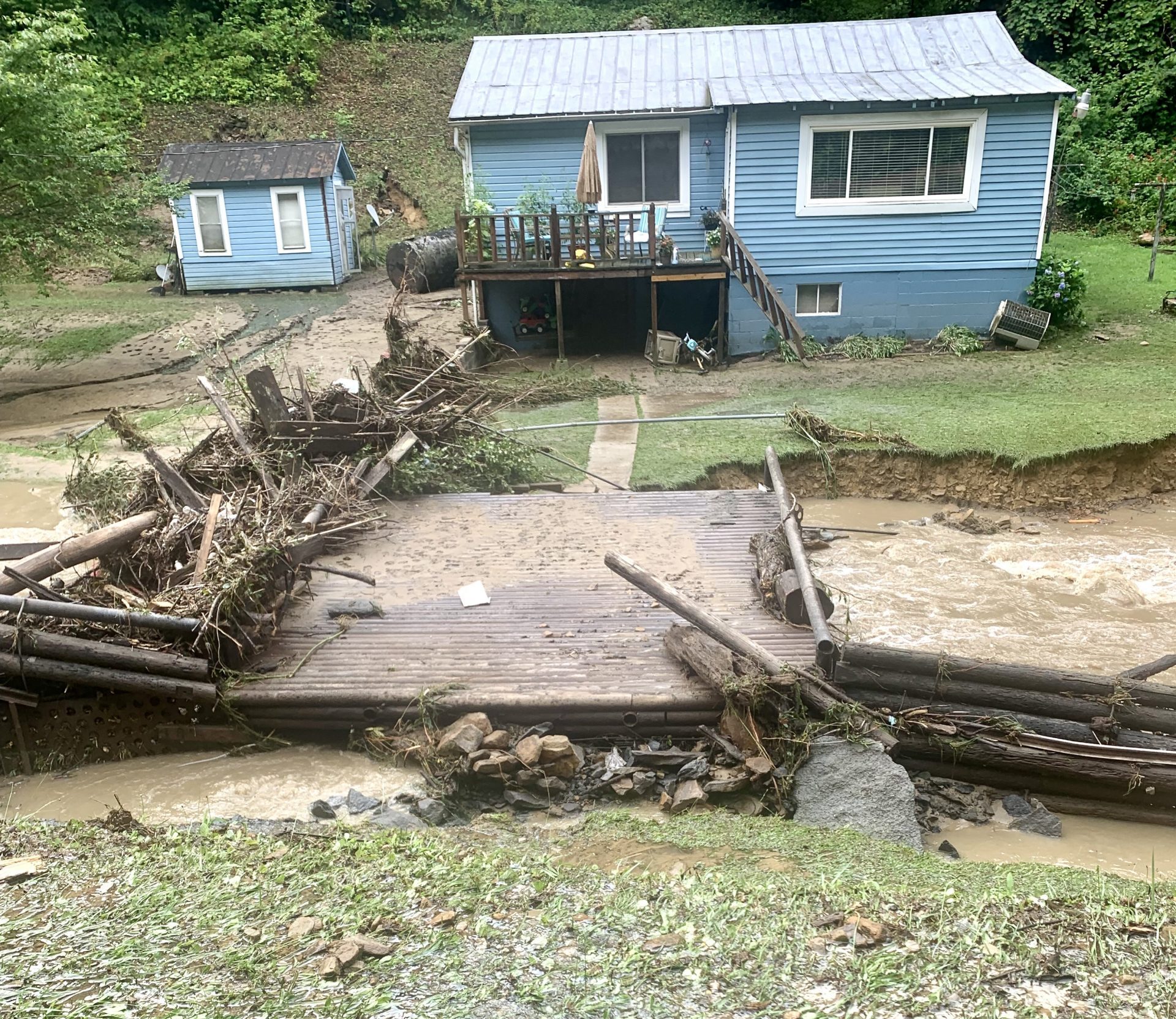
Debris heavily damaged the bridge connecting this Jewell Valley Road home to the road. Flood recovery assistance available through official channels doesn’t cover damage to driveways, bridges or structures other than homes. Photo courtesy of Richard Underwood
When Angie Johnson and her brother, Bobby Keene, went to sleep the night of July 12, 2022, neither realized much of their lives would be swept away before morning dawned.
Overnight rain swelled Dismal Creek in rural Southwest Virginia, in what has come to be known as the Whitewood flood. While homes, vehicles and sections of roadways were torn from the mountainsides, mud and rock slides inundated much of what remained. People were trapped inside homes and buildings.
“It was a miracle that no one, to our knowledge, lost a life during that,” Johnson says.
Johnson lives eight miles from her family’s homeplace on Dismal Creek. The force of the rain hitting her roof woke her at about 3 a.m. When she saw flashing lights below her house and realized law enforcement blocked access to Dismal River Road, she took to Facebook and learned of the flooding. Her brother, who had lived on the family property his entire life following a traumatic brain injury at 15 that left him with a disability, didn’t answer her phone calls.
It was three hours before the road reopened. Fearing the worst for her brother, Johnson took her daughter and began what would be a three-hour journey to find him.
With the river flowing in the road in some places and sections of road missing in others, driving became too treacherous for her small car. They got out and walked, picking their way through mud and around boulders, trees, abandoned vehicles and other debris.
“It was chaos,” she says, adding that she didn’t have the words to describe the roaring of the river.
When Johnson arrived at the property, she learned that Keene, clutching a small bookbag with a few personal belongings, had jumped from the home into chest-high water as the rising creek picked the house up off its underpinnings. He somehow waded through the water to the neighbors, who called to him from their porch.
“They said he sat there and watched the water with them but they said he never spoke a word until about daylight,” Johnson says. “He said, ‘It’s gone. All gone. Everything Daddy worked for. All gone.’”
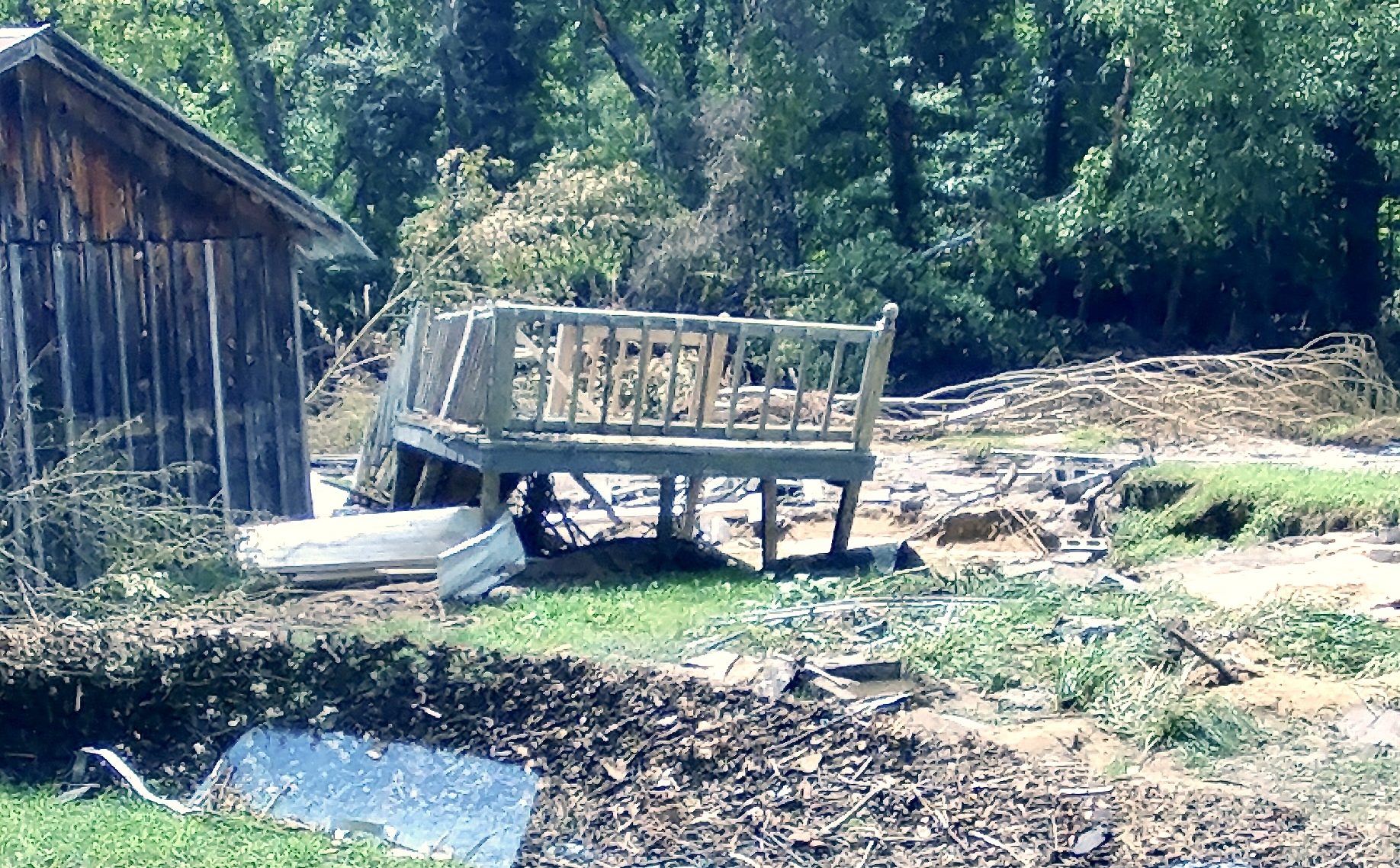
A damaged porch, a piece of mangled skirting and cement blocks scattered amid debris mark the spot where Bobby Keene’s home once stood. Flood waters carried the mobile home off its underpinnings during the 2022 Whitewood flood in Buchanan County, Virginia. Photo courtesy of Angie Johnson
For Johnson and Keene, as for so many others in the Whitewood flood, the ordeal didn’t end when the waters receded. The same is true for many survivors of the 2021 flood in nearby Hurley, Virginia, and the massive 2022 flood that inundated much of Eastern Kentucky and portions of Southwest Virginia just weeks after the Whitewood disaster
Keene lost everything but the clothes on his back and the small bag he carried off the front porch. They had no insurance. Since the flood, Keene has received about $1,500 from charitable organizations — hardly enough to replace personal and household belongings. He doesn’t qualify for assistance from United Way to replace his home because the title was in Johnson’s name. Johnson didn’t qualify because she wasn’t living in the home.
The Federal Emergency Management Agency approved public assistance but not individual assistance for both the Hurley and Whitewood floods. The Virginia legislature passed the Hurley Flood Relief Program in 2022 to help residents who suffered from the 2021 flood. Of the $11.4 million set aside by the Virginia General Assembly for the Hurley Flood Relief Program, $4.46 million has been distributed through 44 applications as of March 31. But the state has not yet passed funding for residents of Whitewood and surrounding areas, and may not.
The United Way has dispersed about $340,000 in assistance to those affected by the Whitewood flood and more than $590,000 remains committed. For the Hurley flood, the organization has expended $672,224 and $252,402 remains. Only homeowners who lived in their homes at the time of the floods qualify for that assistance. These totals include $100,000 in federal dollars funneled to United Way of Southwest Virginia through the Appalachian Regional Commission.
Information provided on the United Way of Southwest Virginia website shows assistance applications for 293 requests are in progress or have been completed for the Whitewood flood and 197 for the Hurley flood. United Way wasn’t able to provide the number of homeowners who need assistance but don’t qualify through the organization.
Available assistance doesn’t cover damage to driveways, bridges or structures other than homes.
Rosa and James Underwood live about 15 miles east of Angie Johnson and Bobby Keene on Jewell Valley Rd. While their house was undamaged, the flood destroyed the bridge across the creek in front of their home, leaving them with no access to the road.
Their pastor helped build a footbridge that allows them to walk over the creek to get to their vehicle for doctor appointments and errands. Both Underwoods are in their 70s and Rosa has arthritis that makes walking difficult. Although James recently had bladder cancer and has been diagnosed with lung cancer, he has done much of the cleanup on his property himself, lacking any assistance.
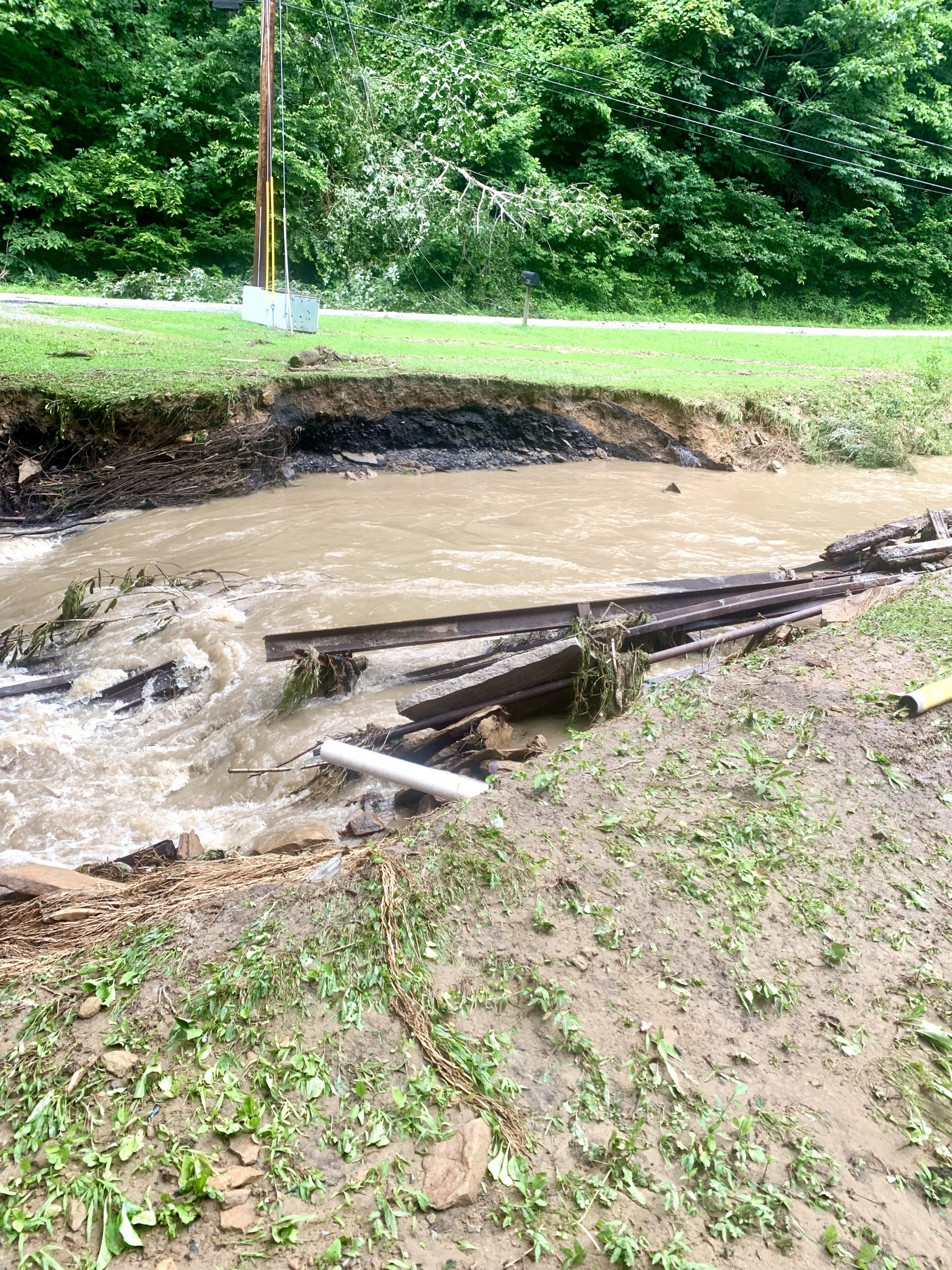
Rosa and James Underwood heard the sound of their bridge being torn from the creek banks during the July 2022 flood in Buchanan County, Virginia. Steel beams and broken cement slabs were all that remained when the waters receded. Photo courtesy of Richard Underwood
The bridge posed a larger problem for the couple. It will cost $20,000 to replace — which the couple cannot afford on their fixed income — but they are not eligible for any assistance through United Way. State Farm Insurance told the Underwoods they will drop their homeowners insurance if the bridge isn’t repaired by May 2024.
According to Buchanan County Supervisor Jeff Cooper, it is illegal for the county to use public money to directly assist residents with repairs to their property.
“In these positions that we’re in as elected officials, it’s unfortunate that we cannot do any upgrade or touch private property,” Cooper says. “If you had a bridge and your bridge washed out to just your house, we can’t help you because it’s a private property.”
Donations received by the county for repair work on homes were distributed to residents through Lowe’s gift cards and the county received more donations of food, toiletries and water than could be used. However, Cooper says “a surprising” number of residents who live in rental properties are not eligible for assistance from United Way and other organizations for help with repairs or replacement of their homes.
The county is storing the surplus donations for the next flood event.
Johnson, Keene and Underwood are not alone in their predicaments. Many have fallen through the cracks into a no-man’s land outside of eligibility requirements. While Johnson has no hope of a new home for her brother, others are receiving help from volunteers and charitable organizations to repair homes damaged by the flood.
One such organization, Impact Missions, which is part of the Baptist General Association of Virginia, has been working in Buchanan County since the Hurley flood of 2021. Butch Meredith coordinates volunteers and contractors for the organization.
Meredith says there are many faith-based organizations that respond to disasters to help with cleanup during the early stage of disaster response. Impact Missions stays for the long-term and continues to help with the rebuilding.
“There are not a lot of organizations that do the rebuild to the degree that BGAV has been doing,” says Meredith, who adds that the group has begun coordinating a multi-denominational volunteer effort.
James and Rosa Underwood have found help through Impact Missions. Meredith recently contacted the couple with the good news that a bridge replacement has been approved and will be completed as soon as the contractors working with the organization can get to it. That will allow the Underwoods to get to their home in their vehicle, and alleviates the fear that their insurance company will drop them.
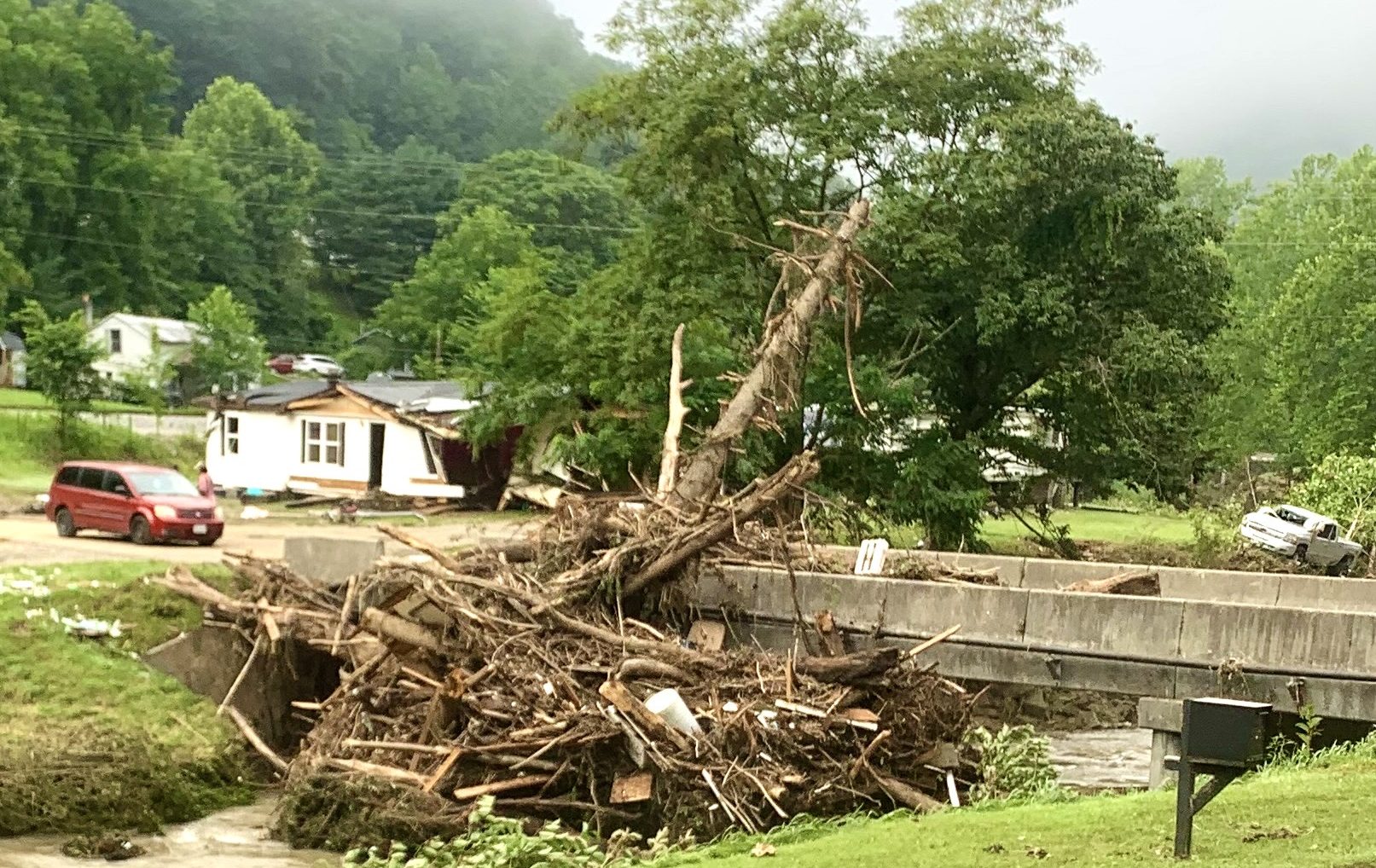
Debris – including trees, tree limbs, brush, household goods and appliances, and even vehicles – damaged many bridges, such as this one on Jewell Valley Road, during the Whitewood flood. Photo courtesy of Richard Underwood
Some area residents, including the Underwoods, are wondering if debris left behind by gas drilling, strip mining and logging companies have contributed to the severity of floods in the region. James Underwood says over the last 20 to 25 years, gas companies cut trees and bushes to build roads and left timber, treetops and other debris laying on the ground. During floods, the debris washes into the creeks and blocks the flow of water, causing them to overflow their banks.
“Same way as the mining industry used to do in here, same thing for the logging companies,” Underwood says.
The Virginia Department of Emergency Management supported Virginia Gov. Glenn Youngkin’s request for an Individual Assistance Declaration from President Biden, which would have turned on FEMA support programs for individual property owners.
“This request was denied, however a Public Assistance Declaration was approved for both Hurley and Whitewood floods, where local governments, state agencies and certain private nonprofits would be eligible for reimbursement of their costs,” says Lauren Opett, director of communications for VDEM.
“VDEM has been heavily engaged in the public assistance grant process and in working with FEMA. $1.8 million has been obligated to date for the Whitewood disaster, and projects are being developed at this time.”
The public assistance grant provides money to repair roads and other public infrastructure. Representatives from the VDEM went to Buchanan County to help apply for federal aid.
“Once the president has declared a federal disaster … then you’ve got to apply to FEMA, and then once FEMA declares that they’re going to give us public assistance, then the work begins,” Buchanan County Emergency Management Coordinator Bart Chambers says.
While grateful for the federal assistance, which helps with rebuilding county roads, water lines and sewer lines, Chambers said a high turnover among FEMA’s grant administrators has made applying for assistance for two federally declared disaster events — the Hurley flood in 2021 and the Whitewood flood in 2022 — frustrating.
“We’re on their fifth administrator [for the Hurley flood], and each one wants something different, and in Whitewood, if I’m not mistaken, we’re either on their second or third.”
“Everyone has a different way of getting to the goal line in their process,” he adds. “And then unfortunately, we get different people with different ways of getting there. And then it goes for review four or five different times, and it could get kicked back in any of those reviews. And when it gets kicked back, you’ve got to start all over again.”
“We’re not specifically trained in dealing with FEMA and getting all the codes right and getting all the I’s dotted and T’s crossed and it’s cumbersome,” Chambers adds.
Other organizations that provide disaster recovery funds use information from the FEMA application but want it in different formats or use different definitions for terms such as how to determine if a property qualifies as destroyed, or has major or minor damage.
“And a lot of times, that means you’ve got to get in the truck and go back over there and revisit it physically,” Chambers says.
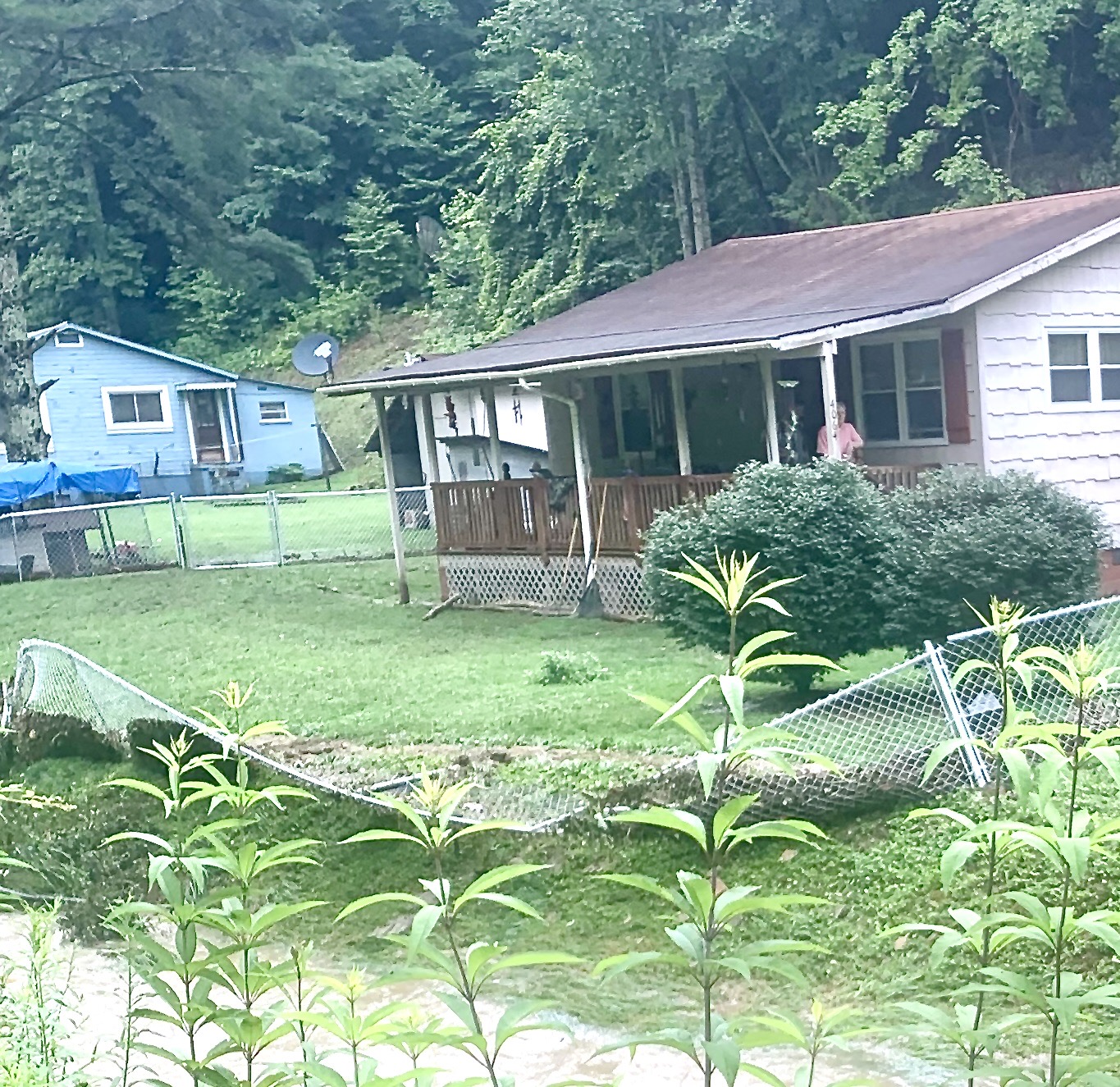
Rosa Underwood looks out from her porch. While the Underwoods’ home escaped damage from the July 2022 flood in Buchanan County, Virginia, the bridge connecting the home to the road was swept away. Impact Missions, an emergency response organization of the Baptist General Association of Virginia, has pledged to help replace the bridge. Photo courtesy of Richard Underwood
Streamlining the applications would help speed up the process and reduce the workload during critical times, especially in rural counties like Buchanan with small staffs. Chambers says if he could see any improvement to streamline the process, it would be to use the same assessment, using the same categories and definitions, for each agency and organization.
Once the applications are submitted, the approval or denial is returned from FEMA quickly, according to Chambers.
Although Chambers and Buchanan County Supervisor Jeff Cooper say they have learned much from the Hurley flood recovery that they’ve been able to apply to Whitewood, they feel the process is complicated and frustrating.
“It’s one of the worst things I’ve ever had to deal with,” says Cooper of the flood recovery process. “It’s just very frustrating. There’s a timeline for everything and they’re not in any hurry. More so, we’re legally bound by these laws that we just can’t make a decision at the county level.”
The frustration continues for Angie Johnson and Bobby Keene. Since Johnson can’t afford to pay cash for another mobile home or RV for her brother to live in, a rental is the only other long-term option. But while Keene’s disability allowance provided enough for him to meet all his expenses when he lived in his own home, it’s not enough for him to afford rent.
According to Johnson, the Virginia Department of Social Services will do a home visit to determine if he qualifies for reduced rent, but only after he’s already living there. That puts the burden of coming up with rent and deposits on Johnson, who already works two jobs to support herself and her daughter.
For now, Keene alternates between staying with Johnson and another brother. The situation is hard for Keene after his narrow escape from the flood and losing the only home he ever knew.
“It’s just devastating,” Johnson says, adding later, “Everyone has dropped the ball.”
April 27, 5:30-7 p.m. at the Buchanan County Public Library in Grundy
As part of an ongoing series of listening sessions across far Southwest Virginia, Appalachian Voices, the publisher of The Appalachian Voice, Southern Appalachian Mountain Stewards, The Clinch Coalition and Virginia Organizing are hosting a listening session in Buchanan County where residents can share thoughts on the flood, community development and other environmental, economic and social topics.
Like this content? Subscribe to The Voice email digests
WV also deals with sudden flooding and the lengthy process of providing info needed for assistance from the government. Much of the causes of flooding is the different companies that come in fix power outages and logging policies. No one claims responsibility for damages left behind, homeowners suffer the consequences when floods come, money’s to help the situation is often misused,again the folks who have no resources are left high and dry.
Please read the tiny bio. given about James Underwood. In his 70’s he’s beaten one type of cancer and is battling a second.
Here is a man who cleaned his and his wife’s property, after the 2022 flood, without waiting for government assistance.
We could all take a lesson from his actions.
Uncle Bear
83+